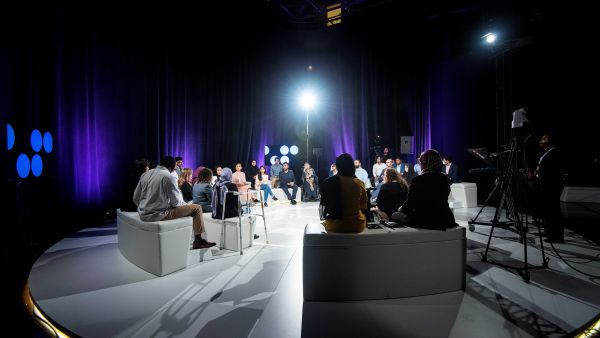Should Geneticists Use New Technologies to Engineer a World With Fewer Disabilities?

Should revolutionary new capabilities in genetic engineering be leveraged in an effort to minimize human disabilities? Or should humanity acknowledge and embrace genetic diversity by restricting how such controversial capabilities are used?
Experts and students with disparate views on those moral, ethical, and legal questions came together for a Doha Debates town hall-style forum at Qatar Foundation’s (QF) World Innovation Summit for Health (WISH) on October 4, 2022. More than 250,000 people around the world viewed the livestreamed discussion.
Disability rights advocate Dr. Victor Pineda joined Doha Debates correspondent Nelufar Hedayat in moderating the town hall. Dr. Pineda is the Dr. Victor Pineda, President and Founder of the Pineda Foundation and World Enabled.
Key participants in the conversation included disability rights activist and former Panamanian First Lady Vivian Fernández de Torrijos and Hamad Bin Khalifa University (HBKU) professor of Islam and biomedical ethics Dr. Mohamed Ghaly. Qatar-based students and young changemakers from around the world, who are part of the 2022 Doha Debates Ambassador Programme, also participated in the discussion.
“The starting point of this conversation is understanding bioethics,” Dr. Pineda began. “Now this is a word with big implications about medicine and genetic technology. These cutting-edge technologies directly affect people like me [who have disabilities] and have a huge impact on the future of the disability community.”
Dr. Pineda summarized two perspectives in the debate over the wisdom of genetic engineering. “At one end of the spectrum, a view basically says we have a moral obligation to use technology to eliminate traits in the gene pool that lead to suffering.
“The other side of the story says that we cannot allow or perpetuate that these technologies basically completely erase disability from the human genome—that we somehow standardize our functioning to one sort of ideal type of person.”
Torrijos, whose daughter’s disabilities prompted her to become a champion for disability rights, said: “We should use technology for a better life. We should use technology to give people days of prosperity. … It’s not dangerous. It's good that we're discussing this theme now, in 2022, because 10 years ago, we were not able to discuss it.” She and several other participants also called for people with disabilities to have key roles in crafting policies around the appropriateness of genetic engineering.
Meanwhile, although supportive of the idea of using genetic engineering to alleviate and prevent suffering, Ghaly urged caution in deciding when to use it to preempt disabilities. “Sometimes disability is not a source of suffering,” he said. He emphasized the importance of “distinguishing between collective policy and individual choice.
“I don’t think it’s a good idea [to] have a state policy” to use genetic engineering to eradicate disabilities.”
Student participants contributed diverse viewpoints. Ina Castro, a nursing student at the University of Calgary in Qatar and a Doha Debates Ambassador, applauded the good intentions of genetic engineers in countering human disabilities, while saying some cases might best be addressed by using “supportive rehabilitation and medical assistive technologies.”
Mariah Arif, a medical student at the University of Qatar, said: “Genetic engineering is a great way of reducing the burden of genetic disease and giving people a better quality of life.
“The downside of this technique could be that people are designing babies so that they have certain desirable traits…which could ultimately reduce tolerance among people for those who are different from them.”
Ghanimeh Saleh El-Taweel, a Ph.D. candidate in translation studies at the University of Antwerp and an instructor at HBKU, argued against genetic engineering to reduce or eradicate disabilities. “As a person with a disability, I believe that my life, as-is, is worth pursuing,” he said.
Meanwhile, Selwin Saju, a high school student at Qatar’s Birla Public School who is visually impaired, said: “If genetic engineering can cure [my] visual impairedness without damaging my life, without killing me, then I would agree to that.”
As the conversation ended, Dr. Pineda urged participants and viewers to learn more about challenges faced by the disability community and their proposed solutions, calling attention to a new video series co-produced by Doha Debates and World Enabled entitled “My Disability Justice.”
This discussion at WISH was the second in a series of Doha Debates Town Hall programs, the first of which featured Nobel Peace Prize Laureate Malala Yousafzai on the future of girls’ education in Afghanistan.
Doha Debates is a member of QF. Town Hall recordings can be accessed via website, YouTube, Twitter, and Facebook channels. The “My Disability Justice” series and other content can be found on Doha Debates’ website.
Background Information
Qatar Foundation
Qatar Foundation (QF) is a non-profit organization made up of more than 50 entities working in education, research, and community development.
Our unique ecosystem—supported by partnerships with leading international institutions—is built on initiatives that address our most pressing challenges, create global opportunities, and empower people to shape our present and future.





